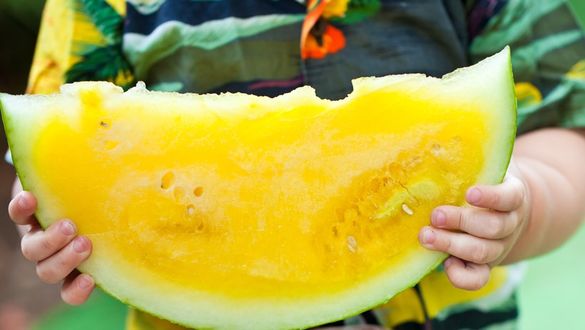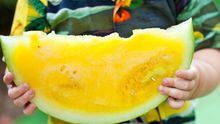 19 Jun 2019
19 Jun 2019
Melons have overtaken pineapples as Britain's fastest growing fruit with their current popularity at an all-time high.
In fact they have become so popular that Tesco now stocks 10 different varieties including a citrus flavoured one with orange flesh and another with white flesh.
And next month it will launch a spectacular looking bright yellow flesh watermelon, as opposed to the regular red-fleshed variety.
In the last year demand for melons has grown by 13 per cent with the Yellow Honeydew variety by far the most popular, accounting for a third of all UK sales.
Tesco melons buyer Joe Baines said last year's extremely hot summer saw sales peaking because of the fruit's thirst-quenching qualities.
Joe Baines commented:
“Traditionally melon sales grow during the summer and then fall in the winter months but this didn't happen last year as the autumn and winter were so mild. Since last summer sales have continued to soar.
“But we also know from customer research that melons, like pineapples, are now seen as value-for-money healthy centre piece desserts that can help kids eat more fruit.
“We've also heard of adults scooping out the seeds and then filling melons up with their alcoholic spirit of choice and leaving them to chill in the fridge all day, ready for a delicious fruit cocktail in the evening.”
As a result of the growing demand Tesco has worked closely with its supplier to bring new varieties to the UK for the first time including:
- Sweet Snowball – super sweet and distinctive because of its white flesh and very pale green, flecked skin
- Sweet Tangy Twist – an orange fleshed melon with a hint of citrus
- Finest Sunkiss – a variety of the Honeydew family with pale orange flesh
Joe Baines added:
“Most people would find it hard to name more than three varieties but Britain is experiencing a kind of melon-mania right now.”
Tesco sells 10 different varieties of melon which are: Yellow Honeydew; Watermelon; Giant Watermelon; Mini Watermelon; Galia; Cantaloupe; Tangy Twist; finest* Piel De Sapo; finest* Sunkiss; and Snowball.
Thanks to better growing techniques melons are now grown in the UK.
ENDS
Note to editors
- Melons count towards one of your 5 a day (80g is a portion)
- Cantaloupe and Galia varieties are high in vitamin C which is important for the immune system, skin, blood vessels, teeth, bones and cartilage. It also plays a role in the release of energy from foods.
- Cantaloupe melon is also high in vitamin A which is important for skin, vision and immune system.
- Melons are low in calories, fat and salt.
A brief history of melons in the UK
Archaeological evidence suggest that melons were grown in Egypt about 2,400 years before Christ.
The first recorded mention for a melon in the UK was in the 16th Century but they only started becoming popular in the UK with the rise of supermarket chains in the mid-70s and the rise of mass importation.
The first variety to become popular in the UK – during the 70s - was the Yellow Honeydew which has gone on to become Britain's favourite melon. It is also the melon most commonly used as the traditional starter for the Christmas dinner.
Melons were still considered a very exotic special treat back then but as demand grew supermarkets brought in the Honeydew variety followed by the far larger watermelon in the 80s and for several decades there were basically these three types for sale in the UK.
The big change took place in the noughties with growing and transportation improvements meaning that better tasting varieties could arrive quicker in the UK.
Two years ago Tesco boosted its range by bringing in three more varieties: the Sweet Snowball; Sweet Tangy Kiss; and the Finest Sunkiss.
With melons cost between £1.50-£3.50 their price per kilo makes them an attractive buy for shoppers.
For more information please contact the Tesco Press Office on 01707 918 701




